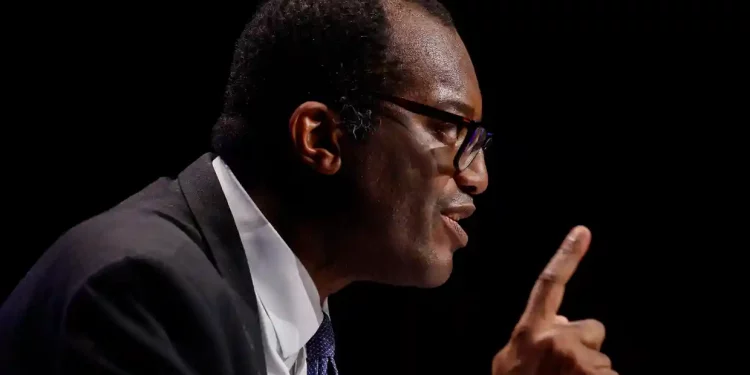Kwasi Kwarteng to bring forward the financial statement to later this month amid disquiet in the party over spending cuts hitting the poorest
Conservative MPs are plotting to avert a squeeze on welfare after Liz Truss was forced into two humiliating U-turns on plans to abolish the top rate of income tax and the date of a new mini-budget.
The Guardian understands Kwarteng will speed up plans for a new fiscal statement, expected to focus on spending and deregulation. It will now occur later this month, rather than on 23 November as previously scheduled, accompanied by new forecasts from the Office of Budget Responsibility, in another move designed to restore market stability.
Senior MPs warned of further rebellions over reductions in public spending, especially on benefits, which the chancellor has declined to rule out.
The threat came as the Institute for Fiscal Studies (IFS) and the Resolution Foundation said there would need to be significant cuts in public spending unless further U-turns on policies were announced in the mini-budget last month.
In a brief and abashed Tory conference speech, Kwarteng admitted it had been a “tough day” – hours after rowing back on the high-earning tax cut. He said his economic plan had caused “a little turbulence”.
Kwarteng said the government was committed to its radical agenda – and would move soon to deregulate sectors including childcare, agriculture, immigration, planning and financial services.
But he also said the government would take fiscal discipline seriously, saying they were “absolutely committed to being serious custodians of the public purse”.
Truss and Kwarteng decided to ditch the cut to the 45% tax rate the night before the conference when the scale of rebellion by MPs made it clear it would not survive a parliamentary vote – with many other tough battles to come.
Cabinet ministers said they believed it was the right decision. “I think we came into contact with the inevitable,” one concluded.
Another said there was a clear need to return to a more rigorous system of cabinet discussions and responsibility, and hinted that a shake-up of No 10 was in the works.
“We have not had true cabinet government since the days of Margaret Thatcher. That needs to change.”
But both MPs echoed economists in warning that the reversal of the abolition of the top rate of income tax would make little difference to the state of the public finances and said they were concerned about what spending cuts would need to be announced.
Mel Stride, the chair of the Treasury select committee, said there were significant issues that remained, even though the U-turn was welcome. “It may be that there will be even yet further requirements to unwind some of those positions,” he said.
The Resolution Foundation said that despite Monday’s U-turn, the richest households would still gain almost 40 times as much as poorer families from policies announced in the mini-budget.
“Unless further U-turns are made, the chancellor will need to announce significant spending cuts on 23 November. The scale of those spending cuts is largely unchanged by today’s U-turn,” the thinktank said before the date of the financial statement was brought forward.
Paul Johnson, the director of the IFS, said there would still need to be a significant cut to spending in order to balance the books. “Unless he also U-turns on some of his other, much larger tax announcements, he will have no option but to consider cuts to public spending – to social security, investment projects, or public services,” Johnson said.
One measure Kwarteng was understood to be considering is raising benefits only in line with wage growth, rather than inflation. This would mean a real terms cut in income for some of the poorest in society and would save around £5bn. Senior government sources said the option was under consideration but Truss had yet to make a call.
The chief secretary to the Treasury, Chris Philp, has also written to departments warning them they must stay within existing budgets or make efficiency savings.
One cabinet minister hinted they were wary of tightening the squeeze on the poorest and said the government would need to make “a very good case” for additional pressures on welfare in order to command support.
Source: The Guardian



Recent Comments